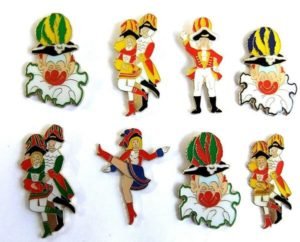As Carnival/Fastnacht/Fasching/Vastelaovend is meant the festive events in advance to the catholic period of fasting. It starts, regionally different, at 11.11., Epiphany, or Mardi Gras and ends at „Aschermittwoch“.
Fastnacht/Fasching/Vastelaovend/Carnival is one of the oldest, but obtained Traditions in Europe and represents a part of our common cultural heritage.
 It founds its roots in Christian middle Ages. The knowledge about and the different traditions was delivered and expanded about generations till today. Unalterable is the carnivalistic tradition timed at the weeks before the period of fasting.
It founds its roots in Christian middle Ages. The knowledge about and the different traditions was delivered and expanded about generations till today. Unalterable is the carnivalistic tradition timed at the weeks before the period of fasting.
The regional different expressions of Vastelaovend/Carnival/Fastnacht/Fasching have already some of the traits of middle ages: masks and changing roles, mockery and humorous critique to the authority, dancing and music, overcoming of social diseases, cheerfulness and joy in Meals and drinks, till things like the Christian expulsion of winter.
Carnival is closely connected with common, political, and economic facts of presence. Through this, Carnival isn’t a fixed, numb tradition, but goes on with time, social and common changes.
The social parts of Carnival are highly recommended, and shown in all regional traditions like throwing sweets, give away bread and sausages, and others.
Carnival grew to an economical factor during the years. Research from “Bund Deutscher Karneval” in part of the economy in the German carnival affected a positive attitude of 46% from the population. In 2010/11 visited 58 Million people carnivalisitic events; on average they visited 3 Events. The economic power is represented in 1.4 Billion Euro invested in the carnival from the population (without counting the double investing through associations)
Carnival/Fastnacht/Fasching/Vastelaovend is grewn from tradition and out of people’s hearts. This delivered cultural property goes yearly through many population levels in whole of Europe as an important and indispensable cycle in their annual flow.



